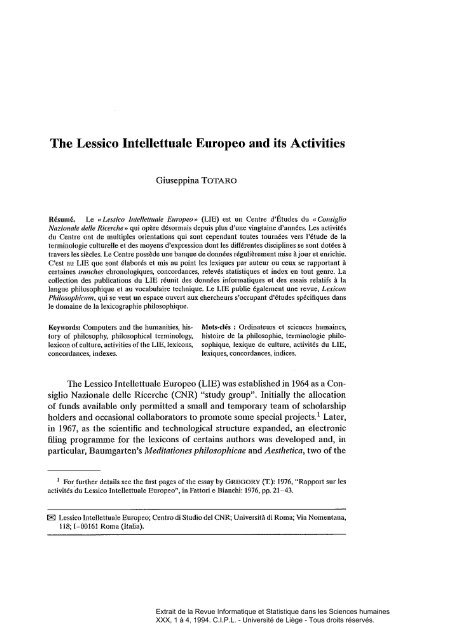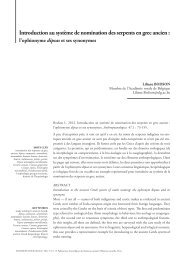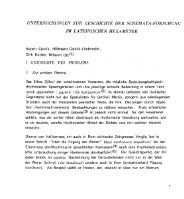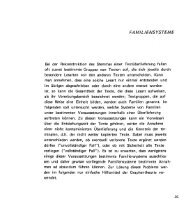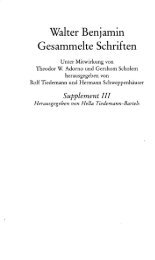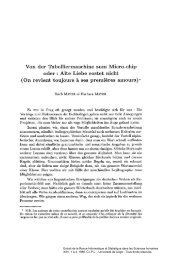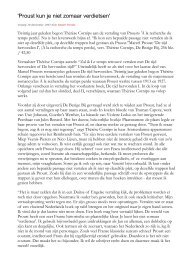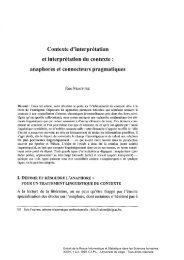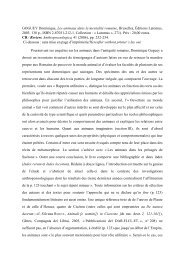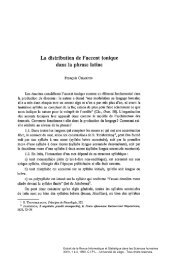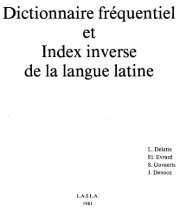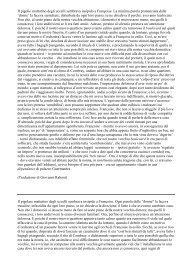The Lessico Intellettuale Europeo and its Activities - Université de ...
The Lessico Intellettuale Europeo and its Activities - Université de ...
The Lessico Intellettuale Europeo and its Activities - Université de ...
You also want an ePaper? Increase the reach of your titles
YUMPU automatically turns print PDFs into web optimized ePapers that Google loves.
<strong>The</strong> <strong>Lessico</strong> <strong>Intellettuale</strong> <strong>Europeo</strong> <strong>and</strong> <strong>its</strong> <strong>Activities</strong><br />
Giuseppina TOTARO<br />
Résumé. Le « <strong>Lessico</strong> Illtelleullale ElIropeo» (LIE) est un Centre d'Étu<strong>de</strong>s du « ConsigNa<br />
Noziol/ale <strong>de</strong>lle Ricerche» qui opère désormais <strong>de</strong>puis plus d'une vingtaine d'années. Les activités<br />
du Centre ont <strong>de</strong> multiples orientations qui sont cependant loutes tournées vers J'étu<strong>de</strong> <strong>de</strong> la<br />
terminologie culturelle et <strong>de</strong>s moyens d'expression dont les différentes disciplines se sont dotées à<br />
travers les siècles. Le Centre possè<strong>de</strong> une banque <strong>de</strong> données régulièrement mise à jour et enrichie.<br />
C'est au LIE que sont élaborés ct mis au point les lexiques par auteur ou ceux se rapportant à<br />
certaines Iranches chronologiques, concordances, relevés statistiques ct in<strong>de</strong>x en tout genre. La<br />
collection <strong>de</strong>s publications du LIE réunit <strong>de</strong>s données informatiques el <strong>de</strong>s essais relatifs à la<br />
langue philosophique el au vocabulaire technique. Le LIE publie également une revue, Lexico/l<br />
PhilosophicWJl, qui se veut un espace ouvert aux chercheurs s'occupant d'étu<strong>de</strong>s spécifiques dans<br />
le domaine <strong>de</strong> la lexicographie philosophique.<br />
Ke)'words: Computers <strong>and</strong> the humanities, history<br />
of philosophy, philosoph.icai terminology,<br />
lexicon of culture, activities of the LIE, lexicons,<br />
concordances, in<strong>de</strong>xes.<br />
Mots-clés: Ordinateurs et sciences humaines,<br />
histoire <strong>de</strong> la philosophie, terminologie philosophique,<br />
lexique <strong>de</strong> culture, activités du LIE,<br />
lexiques, concordances, indices.<br />
11le Lessieo <strong>Intellettuale</strong> <strong>Europeo</strong> (LIE) was established in 1964 as a Consiglio<br />
Nazionale <strong>de</strong>lle Ricerche (CNR) "study group". Initially the allocation<br />
of funds available only permitted a small <strong>and</strong> temporary team of scholarship<br />
hol<strong>de</strong>rs <strong>and</strong> occasional collaborators to promote some special projects.! Later,<br />
in 1967, as the scientific <strong>and</strong> technologieal structure exp<strong>and</strong>ed, an electronic<br />
filing programme for the lexieons of certains authors was <strong>de</strong>veloped <strong>and</strong>, in<br />
particular, Baumgarten's Meditationes philosophicae <strong>and</strong> Aesthetica, two of the<br />
l For further <strong>de</strong>lails see the fust pages of the essay by GREGORY (T.): 1976, "Rapport sur les<br />
activités 'du <strong>Lessico</strong> <strong>Intellettuale</strong> <strong>Europeo</strong>", in Faltori e Bianchi: 1976, pp. 21-43.<br />
o <strong>Lessico</strong> lntellettuale <strong>Europeo</strong>; Centro di Studio <strong>de</strong>I CNR; Università di Roma; Via Nomentana,<br />
118; [-00161 Roma (ltalia).<br />
Extrait <strong>de</strong> la Revue Informatique et Statistique dans les Sciences humaines<br />
XXX, 1 à 4, 1994. C.I.P.L. - <strong>Université</strong> <strong>de</strong> Liège - Tous dro<strong>its</strong> réservés.
THE LESSICO INTELLETTIJALE EUROPEO AND ITS AcrlVITIES 225<br />
you like, of i<strong>de</strong>as, should be analyzed by starting from an examination of the<br />
"expressive instruments" adopted by these same disciplines down through the<br />
centuries.<br />
TIlis approach reproposes the need, as Garin stressed in the 1" International<br />
Conference of the LIE, "for a retnrn to the works in their authenticity,<br />
in a rigorous analysis, that not only focnsses on the historical contexts, but also<br />
examines the more subtle intricate <strong>de</strong>sign beyond the visible immediacy of the<br />
page.'" <strong>The</strong>refore, in Garin's words, it is important "to follow the thinker paying<br />
extremely close attention to his expressions, to their possible variation, to their<br />
permanence, to their stratification, to the insistence on terms, connections,<br />
altered sha<strong>de</strong>s of meaning, internai fluctuations, <strong>and</strong> to hid<strong>de</strong>n ca<strong>de</strong>nces.'"<br />
Hence the constant attention to the particular <strong>de</strong>tails ofan author's lexis; hence,<br />
above aIl, as regards the LIE, the orientation of the lexical <strong>and</strong> historico-critical<br />
analysis towards the language of philosophers, towards that vocabulary that is<br />
the vehicle of their thought. 5<br />
<strong>The</strong> Centre has been perfecting ils instruments, ils approach <strong>and</strong> ils<br />
techniques for examining texts over the years, wilh the purpose of grasping <strong>and</strong><br />
examining their genesis, tradition, internai variations <strong>and</strong> more or less explicit<br />
connections. Il is not by chance that this analysis has concentrated on particular<br />
authors <strong>and</strong> particular historical periods that are consi<strong>de</strong>red crucial for the<br />
<strong>de</strong>velopment of philosophical <strong>and</strong> scientific thought. To give an example, we<br />
can take a brief look at one of the projects currently un<strong>de</strong>r way at the LIE: the<br />
<strong>The</strong>saurus med;ae el recenf;oris lal;nitaf;S.<br />
This un<strong>de</strong>rtaking 6 involves setting up a data base of neologisms, semantic<br />
calques <strong>and</strong> loan-words that have enriched the Latin language over the centuries,<br />
from the Scholastic age to mo<strong>de</strong>rn times.<br />
4 GARIN (E.), "Relazione introduttiva", in Fattori e Bianchi: 1976, p. 6.<br />
S See the brief but incisive essay, GARIN (E.): 1990, "Indirizzo di salulo", in Fatlori e Bianchi:<br />
1990.<br />
6 On the <strong>The</strong>saurus project, cf. GREGORY (T.): 1979, "POUT un 111esaurus Mediae et Recentiorîs<br />
Latinitatis", in Fattori e Bianchi: 1979, pp. 719-738; DURO (A.): 1979, "Aspects Techniques",<br />
in ibid., pp. 739-745; GREGORY (T.): 1988, "<strong>Lessico</strong> <strong>Intellettuale</strong> <strong>Europeo</strong> : Recherches sur<br />
la terminologie intellectuelle du Moyen Âge", in Terminologie <strong>de</strong> la vie intellectuelle au Moyen<br />
Âge, (Thrnhout), pp. 105-108; BOZZI (A.), EMMANUELE (S.): 1982, "1. Esperimento di fusione<br />
automatica di lessici di autori latini in 'machine readable form' : problemï, metodi, risultati.<br />
II. Elaborazione <strong>de</strong>i dati e procedure operative", in Fattori e Bianchi: 1982, pp. 377-392; the<br />
following essays by SPINOSA (G.): 1984, "GIî indici <strong>de</strong>ll' 'Arisloteles latinus' : esperienza di lavoro<br />
in vista di una loro inc1usione nel '<strong>The</strong>saurus Mediae et Recentioris Latinitatis' "; BOZZI (A.): 1984,<br />
"Sistema per la redazione semi-aulomatica <strong>de</strong>lle voci", <strong>and</strong> EMMANUELE (5.): 1984, "Tecnica di<br />
gestione interattiva di dati lessicali relativÎ al TMRL", ail published in Fattori e Bianchi: 1984;<br />
Extrait <strong>de</strong> la Revue Informatique et Statistique dans les Sciences humaines<br />
XXX, 1 à 4, 1994. C.I.P.L. - <strong>Université</strong> <strong>de</strong> Liège - Tous dro<strong>its</strong> réservés.
228 Giuseppina TOTARO<br />
In fact, the seventeenth <strong>and</strong> eighteenth centuries mark "the differentiation<br />
<strong>and</strong> establishment of European philosophical vocabnlary, in both the<br />
similarities <strong>and</strong> differences between the various languages;lJ12 it \Vas almast an<br />
"inc<strong>and</strong>escent magma" that was becoming solidified <strong>and</strong> in this tangled silva,<br />
"the forms introduced distinctions. l ' In the course of these two centuries the<br />
philosophical <strong>and</strong> scientific lexis became established, that vocabulary which has<br />
<strong>its</strong> roots in the long period of Renaissance (<strong>and</strong> even earlier Humanistic) translations,<br />
editions <strong>and</strong> heated <strong>de</strong>bates of the great works of classical antiquity.<br />
11m8 a new science emerged, "the great systems \Vere <strong>de</strong>veloped, the new<br />
encyclopaedia of knowledge was or<strong>de</strong>red <strong>and</strong> organized, the first great histories<br />
\Vere woven, the analysis of ifs foundations <strong>and</strong> structures \Vas begun. d2 And<br />
the common matrix of scientific vocabulary was no longer barbarous-Scholastic<br />
or even Humanistic Latin, but a "neo-Latin" that was greatly influenced by the<br />
different national idioms.<br />
<strong>The</strong> <strong>Lessico</strong> filosofico <strong>de</strong>i secoli XVII e XVIII, edited by Marta Fattori, in<br />
collaboration with Massimo L. Bianchi,13 provi<strong>de</strong>s the map of this chequered<br />
path.<br />
After the long stage of recording the texts, their correction, <strong>and</strong> the<br />
subsequent compiling of the entries, we began pnblishing the work in 1992.<br />
TIIe first volume (a-aetherills), will be followed within the year by the second<br />
(aetherills-anilllllla); the other volumes are scheduled to be published at sixmonthiy<br />
intervals.<br />
<strong>The</strong> individual entries in the Lessica are not introduced by any <strong>de</strong>finition,<br />
in ar<strong>de</strong>r not to superimpose a particular meaning on the more ancient mearllng<br />
by using CUlTent terminology. Each entry is followed by the most significant<br />
passages of the works un<strong>de</strong>r consi<strong>de</strong>ration - in chronological or<strong>de</strong>r of publication-chosen<br />
by the compilers from the vast mass of documentary material<br />
stored in the LIE data base.<br />
If one runs through the list of authors <strong>and</strong> works quoted one has an i<strong>de</strong>a<br />
of the objectives of a scientific project that is inten<strong>de</strong>d, among other things, to<br />
be an appeal "to the value the study of the language of an author <strong>and</strong> of a<br />
period, in aU <strong>its</strong> variations <strong>and</strong> ambiguities, <strong>its</strong> transcriptions <strong>and</strong> translations,<br />
<strong>its</strong> l'emote matrixes <strong>and</strong> close assonances acquires in historical research.,,14<br />
12 GAlUN (E.), "Rclazionc introduHiva", in 1 Colloquio lntemaûollale, op. cit., p. 16.<br />
I3 Cf. PubbUcaziolli, no. 57.<br />
14 GREGORY (1:), "Prcsentazionc", in Lessieo filosofieo <strong>de</strong>i seeoU XVII e XVUI, op. cit. <strong>The</strong><br />
following is a list of the sources for the Lessieo filosofieo <strong>de</strong>i seeoU XVU e XVIl!. <strong>The</strong> abbreviated<br />
name of the author <strong>and</strong> work Îs followed by the year of publication in square brackets: GALlLEI,<br />
Extrait <strong>de</strong> la Revue Informatique et Statistique dans les Sciences humaines<br />
XXX, 1 à 4, 1994. C.I.P.L. - <strong>Université</strong> <strong>de</strong> Liège - Tous dro<strong>its</strong> réservés.
'filE LESSICO INTELLETI1JALE EUROPEO AND ITS ACTIVITIES 229<br />
<strong>The</strong> international conferences organized by the LIE every three years are<br />
<strong>de</strong>voted to the i<strong>de</strong>ntification of the uses of particular philosophical terms, to<br />
their equivalents in vernacular languages, <strong>and</strong> to the study of their sources. <strong>The</strong>y<br />
olIer an important opportunity for reflection on the various lexicographical<br />
projects <strong>and</strong> for exchange <strong>and</strong> verification between scholars engaged in various<br />
areas of research. <strong>The</strong> essays contained in the Conference Proceedings permit<br />
the history of the term un<strong>de</strong>r investigation to be reconstructed in <strong>its</strong> entirety,<br />
<strong>and</strong> also illustrate the multiple uses of computers in the humanities.<br />
A first introductory conference concerned the projects in progress, the<br />
problems posed, <strong>and</strong> the prospects indicated by the completion of the various<br />
un<strong>de</strong>rtakings. 1llen followed conferences on Ordo in 1977, on Res in 1980,<br />
on Spiril/lS in 1983, on Phal/lasia-Imagil/atio in 1986, on !<strong>de</strong>a in 1989, <strong>and</strong> on<br />
Ratio in 1992 (proceedings forthcoming).15 1l1e next conference, scheduled for<br />
January 1995, will be <strong>de</strong>voted to the analysis of Senslls in <strong>its</strong> double meaning of<br />
faculty of feeling <strong>and</strong> receiving impressions produced by external stimuli, <strong>and</strong><br />
of meaning, of the concept expressed by a word or sentence.<br />
Si<strong>de</strong>reus IlImciliS [1610]; KEPLER, Harmoniee mill/di [1619]; CAMPANELLA, Desensll rertltll et 11Iagia<br />
[1620J; BACON, Novum orgmlflm [1620]; BACON, De dignitate et allgmel/tis sciellliarum [1623J;<br />
HERBERT, De veritate [1624); Gassendi, E;œrcitarioncs paradoxieae [1624-58J; GROOT, De jure<br />
belli ae paeis [1625]; DESCARTES, Reglliae ad direeliollem illgellH [1627-28, date of writing (1701)J;<br />
KOI-.iENSKY, Prodromlls pallsophiae [1639); DESCARTES, Meditaliolles <strong>de</strong> prima philosophia<br />
[1641]; DESCARTES, Objeerioncs cllm respomioniblls [1641J; DESCARTES, Objectiones seplimae<br />
ill meditaliolles [1642J; HOBBES, De eù'e [1642]; DESCARTES, Prillcipia pltilosophiae [1644J;<br />
HOBBES, De eorpore [1655); CLAUBERG, De eogllitione Dei [1655]; HOBBES, De llOmille [1658J;<br />
GEULINCX, Ethica [1665]; MORE, E1Ichiridion elhieum [1667-69]; SPINOZA, Tractatlls theologico<br />
POliliclls [1670J; MORE, Ellehiridion melaphysiclltll [1671]; PUFENDORF, De jure Ilaturae el<br />
genlillm [1672J; SPINOZA, Tractatus <strong>de</strong> intel/eelUs emendatione [1677J; SPINOZA, Ethica [1677];<br />
LEIBNIZ, Nova metllOdus [1684]; LEIBNIZ, Meditationes <strong>de</strong> eogni/ione [1684]; LEIBNIZ, Brevis<br />
<strong>de</strong>monslratio [1686]; LEIBNIZ, De geometria reeondita [1686]; NEWTON, Phi/osophiae naturalis<br />
principia mathemalica [1687]; TSCHlRNHAUS, Medicilla mentis [1687}; LEIBNIZ, lèntamell <strong>de</strong><br />
motullm eoeleslium causis [1689]; LEIBNIZ, De causa gravitatis [1690}; GEULINCX, Metaphysica<br />
[1691J; LEIBNIZ, De /egibus Ilaturae [l691}; LEIBNIZ, De primae phiJosophiae emelldatio1le [1694];<br />
LEIBNIZ, Specimen dYllamieum [1695]; LEIBNIZ, De ipsa natllra [1698]; VICO, De Ilostri tempori...<br />
stlldiOYllm ratiolle [170S}; LEIBNIZ, Callsa Dei [17lOJ; VICO, De alltiquissima lta/orum sapienlia<br />
[1710J; WOLFF, Disellrsl/s praeliminaris [1731]; WOLFF, Philosophia prima sive olltologia [1730];<br />
WOLFF, Cosm%gia generalis [1731]; WOLFF, PsycllO/ogia empirica (1732); WOLFF, PsycllO/ogia<br />
rationalis [l734}; BAUMGARTEN, Meditationes phi/osophicae [1735]; 's GRAVESANDE, Imrodllclio<br />
ad phiJosophiam [1736J; GENO\'ESI, E/emellta metaphysicae 1 [1743]; GENOVESI, E/emell1a<br />
artis logicocrilieae [1745J; GENOVESI, E/ementa metaphysicae Il [1747J; BAUMGARTEN, Aesthelica<br />
[1750-58]; GENOVESI, Elemenla metaphysica III [1751]; KANT, De igl1e [1755]; KANT,<br />
Nova diJucidalio (1755]; KANT, Monadologia physiea [1756]; KANT, De l1umdi sensibilis li/que<br />
intelligibilis forma et prillcipiis disserlatio [1770].<br />
15 For the Proceedillgs of the conferences cited, cf. Pubblicaziolli, no. Il,20-21,26,32,46,51.<br />
Extrait <strong>de</strong> la Revue Informatique et Statistique dans les Sciences humaines<br />
XXX, 1 à 4, 1994. C.I.P.L. - <strong>Université</strong> <strong>de</strong> Liège - Tous dro<strong>its</strong> réservés.
230 Giuseppina TOTARû<br />
Here lexical analysis is integrated with historico-critical analysis, with the<br />
history of the texts <strong>and</strong> their formation, tradition <strong>and</strong> success down through the<br />
centuries.<br />
Elements for analysis <strong>and</strong> refiection have emerged from seminars organized<br />
on specific themes or <strong>de</strong>riving from precise methodological requirements,<br />
connected with carrying out research. This led to the following conferences on<br />
Francis Bacon. Termillo1ogia e fortll1la nef XVII secalo, on 1sogni nel medioevo,<br />
on Staria <strong>de</strong>lle i<strong>de</strong>e. Problemi e prospettive <strong>and</strong>, last but notleast, on L'in!inito<br />
ill Leibniz. Problemi e termiflologia.16<br />
TIIe LIE series of publications also has an ample section <strong>de</strong>voted to monographs<br />
in which the results of researches on the vocabulary of philosophers are<br />
published: specific subjects are <strong>de</strong>aIt with by specialists who in their studies have<br />
directed their research to individual authors, specific periods <strong>and</strong> to sorne terms<br />
or families of terms, or who are working on different lexicographical projects.<br />
As regards classical antiquity, for instance, Antonia Cancrini's study Synei<strong>de</strong>sis.<br />
Il tema semantico <strong>de</strong>lla ucon-scientia" nella Grecia ulltica,17 examines, through<br />
very extensive documentation, the difference in meaning between the terros <strong>and</strong><br />
syntagms in the various statements of the concept of conscience; <strong>and</strong> Walter<br />
Belardi's volume Filosofia, grammatica e retorica /leI pellsiero Gntico,18 is a<br />
collection of various essays on theories of language in the ancient world.<br />
<strong>The</strong>re are also numerous volumes <strong>de</strong>voted to medieval philosophical<br />
terminology, at times complete with very <strong>de</strong>tailed in<strong>de</strong>xes <strong>and</strong> inventories,l9<br />
such as Alfonso Maierù's important book on Terminologia logica <strong>de</strong>lla tarda<br />
scolastica. <strong>The</strong>se volumes are extensive studies that analyze the changes in the<br />
meaning of certain terms as compared to others, the <strong>de</strong>veloping precision of<br />
certain notions, the modification of some meanings in the different fields of<br />
literature, logic, biblical interpretation <strong>and</strong> the intellectual lexis of the period<br />
when the universities were established <strong>and</strong> a specifie technical vocabulary<br />
emerged.<br />
As we have said, the Centre's projects have particularly focussed on the<br />
period between the sixteenth <strong>and</strong> eighteenth centuries. TIIe essays on Mathesis<br />
IIniversalis. Genesi di lin 'i<strong>de</strong>a ne! XVI secol0 2o are <strong>de</strong>voted to the origins<br />
16 Cf. Pubblicaûolli, no. 33, 35, 49, 52.<br />
17 Cf. PllbblicaziOlli, no. 6.<br />
18 Cf. Pubblicaûoni, no, 37,<br />
19 Cf. Pllbblicazioni, no. 5,8,9,39,<br />
20 Cf, Pllbblicaziolli, no. 2.<br />
Extrait <strong>de</strong> la Revue Informatique et Statistique dans les Sciences humaines<br />
XXX, 1 à 4, 1994. C.I.P.L. - <strong>Université</strong> <strong>de</strong> Liège - Tous dro<strong>its</strong> réservés.
232 Giuseppina TOTARO<br />
compiling ofin<strong>de</strong>xes, concordances <strong>and</strong> lexieons of individual authors or works.<br />
<strong>The</strong> <strong>de</strong>velopment of these "instruments" indispensable ta research constitutes,<br />
as has been said, a level of increasing "centrifugation" of the text, however<br />
the convietion still holds good that, especially in the field of the history of<br />
i<strong>de</strong>as, l'les mots n'assument un sens que dans leur contexte et que celui-ci<br />
doit être défini à chaque fois avec l'ampleur nécessaire pour donner un sens<br />
au mot et le rattacher, dans le mesure du possible, à l'horizon culturel et<br />
historique <strong>de</strong> l'auteur; c'est seulement <strong>de</strong> cette façon que l'on pourra apporter<br />
<strong>de</strong>s éclaircissements - sans forcer le sens - sur la polysémie radieale qui est<br />
le propre du langage philosophique."28<br />
<strong>The</strong> Centre has published numerous lexicographieal instruments, which<br />
are partieularly useful not only for historians ofculture, but also for philologists<br />
<strong>and</strong> linguists.<br />
'TI1e lll<strong>de</strong>x dll Corplls Hermetiellm 29 is the indispensable complement to<br />
the Nock-Festugière edition of a fundamental document of the culture of<br />
late antiquity. <strong>The</strong> Glossarillm Epiellrellm 30 elaborated from the in<strong>de</strong>x cards<br />
<strong>de</strong>veloped by Dsener, the editor of the most famous collection of Epieurean<br />
texts, allows one to examine the ancient philosopher's language in <strong>de</strong>pth<br />
through the electronie filing of his most complex works. 111en we must also<br />
mention the Note di lessieografia ippoeratica. II tral/ato slIlle arie, le aeqlle,<br />
i IIIOghi 3 ! edited by Andrea Bozzi <strong>and</strong> the first two weighty volumes of the<br />
Lessieo <strong>de</strong>lle "Novellae" di Gillstilliallo Ilella versiolle <strong>de</strong>ll' ''Allthelltiellm'' by<br />
Anna Maria Bartoletti Colombo. 32 111e llldices ehemieol'llm graeeorllm 33 by<br />
Robert Halleux show in exemplary fashion that if the terminologieal analysis<br />
provi<strong>de</strong>d by lexicons, in<strong>de</strong>xes <strong>and</strong> concordances is a precious instrument for<br />
the un<strong>de</strong>rst<strong>and</strong>ing <strong>and</strong> interpretation of an author or a work, in the case of<br />
alchemic literature lexical electronie filing provi<strong>de</strong>s a real key to <strong>de</strong>ciphering<br />
the theoretieal discourse.<br />
28 GREGORY (T.), "Rapport sur les activités du <strong>Lessico</strong> Intellcttuale <strong>Europeo</strong>", in 1 Colloquio<br />
!lItemaziOllole, op. cil., p. 27.<br />
29 Cf. Pubblicazioni, no. 13.<br />
30 Cf. Pubblicaziolli. no. 14.<br />
31 Cf. Pubblicazioni, no. 28.<br />
32 Cf. PubbUcaûoll, no. 30 <strong>and</strong> 38.<br />
33 Cf. PubbUcaûolli, no. 31.<br />
Extrait <strong>de</strong> la Revue Informatique et Statistique dans les Sciences humaines<br />
XXX, 1 à 4, 1994. C.I.P.L. - <strong>Université</strong> <strong>de</strong> Liège - Tous dro<strong>its</strong> réservés.
THE LESSICO INTELLETfUALE EUROPEO AND ITS AcnVlTiES 233<br />
Lexical electronic filing <strong>and</strong> conceptual analysis merge in the Glossario<br />
filosofico ebraico-italial/o <strong>de</strong>i XIII secol0 34 in which Giuseppe Set'moneta combines<br />
the terrninological element <strong>and</strong> analytic commentary, illustrating the <strong>de</strong>velopment<br />
of a linguistic legacy of medieval Jewish culture <strong>and</strong> ils subsequent<br />
reception.<br />
With regard to lexical electronic filing, as we have seen the LIE series of<br />
publications inclu<strong>de</strong>s many concerning works of ancient <strong>and</strong> medieval culture,<br />
however, by far the largest number is <strong>de</strong>voted to the period between the<br />
sixteenth <strong>and</strong> eighteenth centuries. Here it is possible to observe the <strong>de</strong>dine<br />
of Latin as the principal means of communication among the learned, <strong>and</strong><br />
<strong>its</strong> slow, but inexorable replacement by national languages. In this continuai<br />
exchange with Latin, the philosophical vocabulary is evi<strong>de</strong>nce of the evolution,<br />
transformation <strong>and</strong> consolidation of intellectnal terminology.<br />
Descartes is a case in point. A bilingnal author par excellel/ce, he chooses<br />
Latin for his more purely "philosophieal" works, but he coins new words,<br />
attributes new meanings to old \Yords or even introduces Latin terms or<br />
sentences into French contexts, when he does not <strong>de</strong>em the latter sufficient<br />
to ren<strong>de</strong>r the lexical richness <strong>and</strong> appropriateness of certain Latin expressions.<br />
<strong>The</strong> in<strong>de</strong>xes of the Reglilae ad directiol/em il/gel/Ii <strong>and</strong> of the Discollrs <strong>de</strong> la<br />
métho<strong>de</strong>, compiled respectively by l-R, Armogathe <strong>and</strong> l-L, Marion, <strong>and</strong> by<br />
P.-A. Cahné as part of the Éqllipe Descartes 35 research projects, allow one to<br />
analyze this phenomenon from the exhaustive electronic filing of two major<br />
works of mo<strong>de</strong>rn philosophical thought.<br />
Though Baruch Spinoza's philosophical work appears more well-knit <strong>and</strong><br />
to be written only in Latin, it is possible to find Hispanisms, major variations<br />
in spelling <strong>and</strong> anomalous forms in his vocabulary; new me31llng is given to<br />
traditional terrninology, following Descartes'lexical <strong>and</strong> philosophical example.<br />
<strong>The</strong> II/dici <strong>de</strong>i "Trac/allls <strong>de</strong> intel/ectlls emel/datiol/e" <strong>and</strong> of the Trac/atlls<br />
theologico-politicllS 36 are instruments for examining Spinoza's terminology in<br />
<strong>de</strong>pth, both have been published in "Lexicon philosophicum", the LIE jonrnal;<br />
they almost complete the electronic filing of Spinoza's works, that began with<br />
34 Cf. Pllbblicazioni, no. 1.<br />
35 Cf. Pubblicaziolli, no. 10 <strong>and</strong> 12.<br />
36 Cf. CANONE (E.), TOTARO (G.): 1991, "I1'Tractatus <strong>de</strong> intelJectus emendatione' di Spinoza.<br />
In<strong>de</strong>x locorum", Lexicoll Philosophicum, 5, pp. 21-127; TOTARO (G.), VENEZIANI (M.): 1993,<br />
"Indicî e concordanze <strong>de</strong>i '1factatus theologico-politicus' di Spinoza", ibid., 6, pp. 51-204.<br />
Extrait <strong>de</strong> la Revue Informatique et Statistique dans les Sciences humaines<br />
XXX, 1 à 4, 1994. C.I.P.L. - <strong>Université</strong> <strong>de</strong> Liège - Tous dro<strong>its</strong> réservés.
234 Giuseppina TOTARO<br />
the publication of the in<strong>de</strong>xes <strong>and</strong> concordances of the Ethica <strong>and</strong> of the<br />
Tractatlls politicllS 3 ?<br />
One electronic filing of texts that best docnments the introduction into<br />
the intellectual lexis of new sections of vocabulary-especially in the fields<br />
of metaphysics, theology <strong>and</strong> the sciences-is the <strong>Lessico</strong> greco-Iatillo 38 by<br />
Marsilio Ficino.<br />
A new <strong>and</strong> <strong>de</strong>cisive thrust to researches in this direction came from the<br />
publication of the <strong>Lessico</strong> di Giordallo Brlllw 39 by Michele Ciliberto, wlùch<br />
provi<strong>de</strong>s an ample selection of the most significant words from Dialoghi italialli<br />
<strong>and</strong> Call<strong>de</strong>laio, giving a picture of Bruno's lexical variety <strong>and</strong> linguistic vitality<br />
<strong>and</strong>, more generaUy, of Renaissance philosophical terminology. TIle LIE has<br />
also published the anastatic reprint of the SlIlIIlIIa terlllillorlllll lIIetaphysico<br />
1'11111 40 by Giordano Bruno, one of lùs lesser known works, but il contains aU his<br />
"metafisica",<br />
Among the projects cnrrently un<strong>de</strong>rway at the LIE, E. Canone's original<br />
research <strong>de</strong>serves a special mention. Tt entails the pnblication of a unified<br />
computer in<strong>de</strong>x of the entries (lemmas, syntagms <strong>and</strong> locutions) of the major<br />
Latin philosophicallexicons of the seventeenth centnry, from the brief SYllopsis<br />
by H.L. Chasteigner, 1612, to the Lexicoll ratiollale by E. Chauvin, 1692.<br />
Though engaged in the <strong>de</strong>velopment of different lexicographical instruments<br />
(in<strong>de</strong>x verbOfU11l, in<strong>de</strong>x !OCOTUnJ , frequency lists, lemmatized <strong>and</strong> U11lemmatized<br />
concordances, vocabulary Iists, form lists etc.), the LIE has always<br />
stressed the importance of author lexicons as crucial instruments, especiaUy in<br />
researches into the history of i<strong>de</strong>as, because of their ability to take into account<br />
the radical polysemy of the language of philosophy. As we have already said,<br />
only words in contexts of varying lengths, <strong>de</strong>pending on the need to make the<br />
text comprehensible, express <strong>and</strong> illustrate their meaning to the full.<br />
<strong>The</strong> <strong>Lessico</strong> <strong>de</strong>i HNovum orga/wm" di Francesco Baconé 1 compiled by<br />
M. Fattori cornes into this particular province. Tt is the result of painstakingly<br />
selecting <strong>and</strong> compiling around 2,200 entries, from the more extensive data<br />
obtained from electronic filing. Tt is superfluous to insist on the usefulness<br />
37 Cf. GUÉRET (M.), ROBINET (A), TOMBEUR (P.): 1977, Ethica. Concordances, in<strong>de</strong>:r, Ustes<br />
<strong>de</strong> fréquences, tables comparatives, Latin text, translation by MOREAU (P.-P.), electronic in<strong>de</strong>x by<br />
MOREAU (P.-F.) <strong>and</strong> BOUVERESSE (R.), (Paris).<br />
38 Cf. PubblicazioJli, no. 15.<br />
39 Cf. Pubblicaziolli, 110.16-17.<br />
40 Cf. Pubblicaziolli, no. 48.<br />
41 Cf. PubbHcaziolli, no. 23-24.<br />
Extrait <strong>de</strong> la Revue Informatique et Statistique dans les Sciences humaines<br />
XXX, 1 à 4, 1994. C.I.P.L. - <strong>Université</strong> <strong>de</strong> Liège - Tous dro<strong>its</strong> réservés.
THE LESSICO INTELLETTIJALE EUROPEO AND ITS AcnVITlES 235<br />
of a <strong>Lessico</strong> of this kind. Works Iike this enable the rea<strong>de</strong>r to access the<br />
author's language directly <strong>and</strong> synoptically grasp-as in the case of Bacon <strong>and</strong><br />
his NOVI/Ill orgalll/lIl, opposed, as the title suggests, to the old, Aristotelian<br />
OrgmlOll-the enrichment <strong>and</strong> transformation of the philosophico-scientific<br />
dictionary at the beginning of the seventeenth century.<br />
A lexicon of the Paragrallll11l 1 Paracelsus's most successful <strong>and</strong> significant<br />
philosophical work, is scheduled to be published by the LIE during the course<br />
of this year: the volume will be compiled by M.L. Bianchi who has already<br />
published the in<strong>de</strong>xes. 42 <strong>The</strong> latter provi<strong>de</strong> the rea<strong>de</strong>r with a kind of "Ariadne's<br />
thread", which is indispensable for finding one's way through the <strong>de</strong>nse forest<br />
of Paracelsian vocabulary, which is particularly bristling with difficulties <strong>and</strong><br />
lexical "novelties".<br />
While the vocabulary of Paracelsus <strong>and</strong> Bacon documents the profoundly<br />
innovative range of their thought, an equally radical transformation is to be<br />
found in philosophicallanguage at the beginning of the German Enlightenmenl.<br />
<strong>The</strong> <strong>Lessico</strong> ftlosoftco <strong>de</strong>lla Friiaufkliinlllg,43 edited by Dagmar von Wille,<br />
is evi<strong>de</strong>nce of the vitality <strong>and</strong> the use of Latin in sorne works by Christian<br />
Thomasius, Christian Wolff <strong>and</strong> Johann Georg Walch, at the beginning of that<br />
heated <strong>de</strong>bate which was to lead to the adoption of serlllo vl/Igaris in scientific<br />
disciplines. As is well-known, Thomasius was the first to give university lectures<br />
in German, thus claiming the need to transfer into his MI/tler-Sprache that<br />
intellectual legacy that had until then been expressed exclusively in Latin.<br />
<strong>The</strong> <strong>Lessico</strong> perm<strong>its</strong> one to observe the transformations that were the first<br />
consequences of that complex <strong>de</strong>bate, the insertions <strong>and</strong> overlappings of the<br />
two languages, the attempts-already anticipated by Leibniz 44 -to conclu<strong>de</strong> a<br />
project for the complete emancipation of the German philosophicallexis.<br />
Kant is an exemplary case in point. He un<strong>de</strong>rlines the need to resort<br />
to the more firmly-established Latin terminology even in German texts when<br />
specific Kl/llsMorter cannot be found in the national idiom. In fact the great<br />
period of philosophical <strong>and</strong> scientific Latin prose cornes to a close with Kant:<br />
with the adoption of the vemacular, Latin lost <strong>its</strong> function as the vehicle of<br />
expression common to ail intellectuals <strong>and</strong> became exclusively relegated to<br />
42 Cf. PubblicazioJli, no. 47.<br />
43 Cf. PubblicazioJli, no. 54.<br />
44 E. eanOlle edited the ill<strong>de</strong>x Jocorum of the Ermahmmg ail die Telllsche, the text in which<br />
Leibniz hoped for "the foundation of a company which, sponsored by a noble patron, would<br />
publish a series of fundamental works written in German" (Lexicoll phiJosophic/l11l, 4-1989, p. 3).<br />
Regarding the Leibniz lexicon, LIE is currently compiling a "contrastive" concordance of the Latin,<br />
German <strong>and</strong> French versions of the MOlladologia, edited by Lamarra, Pimpinella <strong>and</strong> Tagnon.<br />
Extrait <strong>de</strong> la Revue Informatique et Statistique dans les Sciences humaines<br />
XXX, 1 à 4, 1994. C.I.P.L. - <strong>Université</strong> <strong>de</strong> Liège - Tous dro<strong>its</strong> réservés.
236 Giuseppina TOTARO<br />
ecclesiastical disciplines <strong>and</strong> cil·cles. 111e two volumes of the l1ulici e concordanze<br />
<strong>de</strong>gli scrifti latini di fmmantlel Kant 45 -part of a more extensive bilateral<br />
project of lexical researches on Kant's works being carried out by the LIE<br />
(co-ordinator: P. Pimpinella) <strong>and</strong> the Philosophy Department of the University<br />
of Trier (co-ordinator: N. Hinske)-provi<strong>de</strong> a key for accessing <strong>and</strong> reading<br />
some fundamental works of Kantian metaphysics <strong>and</strong> for establishing a philosophical<br />
terminology that was to be further <strong>de</strong>veloped in the "Transcen<strong>de</strong>ntal<br />
Dialectics H ,<br />
<strong>The</strong> imminent publication of a lexicon of Baumgarten's aesthetic vocabulary,<br />
from the point of view of philosophical language, will allow one to<br />
follow the evolution <strong>and</strong> <strong>de</strong>velopment of that <strong>de</strong>bate which led in the Germanspeaking<br />
area ta the creation of the "<strong>de</strong>sperate meanslJ-these are Kant's<br />
wards-of neologisms, sorne of which l like for instance the very terro aesthetica,<br />
were <strong>de</strong>stined to be particularly successfu!. 46<br />
With regard to the Italian language area, Vico's Orazioni inatlgtlrali,47 a<br />
document of great importance for the elaboralion of the later Scienza IllIOVa,48<br />
have been analyzed <strong>and</strong> un<strong>de</strong>rgone electronic liIing. 11le publication of the<br />
in<strong>de</strong>xes <strong>and</strong> concordances of another major work by Vico is also scheduled:<br />
the De antiqtlissima lIalorum sapientia, edited by G. Adamo.<br />
In addition to researches on the subject of lexicometry, bibliographies of<br />
the material <strong>and</strong> usages of authors, the results of which have been parlially<br />
published,49 the LIE has brought out a journal, "Lexicon philosophicum.<br />
Qua<strong>de</strong>rni di terminologia filosofica e storia <strong>de</strong>lle i<strong>de</strong>e", that has now reached<br />
<strong>its</strong> sixth issue, edited by Antonio Lamarra <strong>and</strong> Lidia Procesi. <strong>The</strong> journal<br />
is inten<strong>de</strong>d to be a kind of permanent workshop for scholars who wish to<br />
communicate the results oftheir researches, publish lexicographical instruments<br />
related to the LIE's programmes, compare ditferent work experiences; in other<br />
wards, uLexicon philosophicum l ' aims ta make ils own contribution ta that<br />
<strong>de</strong>bate that is an indispensable resource for the scientific community in general<br />
<strong>and</strong> for the humanilies in particular.<br />
45 Cf. Pubblicaziolli, no. 42 <strong>and</strong> 53.<br />
46 Sec GREGORY (T.), "Sullessico filosofico latina <strong>de</strong>i Seicento e <strong>de</strong>i Settccenlo", op. cit., pp. 2<br />
<strong>and</strong> 10, in particular.<br />
41 Cf. Pllbblicazioni, no. 55.<br />
48 <strong>The</strong> LIE has published the anastatic reprint of the Naples 1725 edition, complete \Vith<br />
concordances <strong>and</strong> frequency in<strong>de</strong>xes, of G. Vico's Principi di lma sciellw mlOva illtomo alla llatllra<br />
<strong>de</strong>lle Ilazioni, edited by DURD (A.) [Rome], 1981 (Pubblicaziolli, no. 25).<br />
49 Sec the volumes cited in the list of Pllbblicaziolli, no. 27, 29, 36, 41, 44.<br />
Extrait <strong>de</strong> la Revue Informatique et Statistique dans les Sciences humaines<br />
XXX, 1 à 4, 1994. C.I.P.L. - <strong>Université</strong> <strong>de</strong> Liège - Tous dro<strong>its</strong> réservés.
THE LESSICO INTELLETIUALE EUROPEO AND lTS ACTIVITIES 237<br />
A final consi<strong>de</strong>ration remains to be ma<strong>de</strong>. <strong>The</strong> initial enthusiasm aroused<br />
by the episodic application of computer science in the field of the humanities,<br />
has now given way to greater awareness. Today the computer is a wi<strong>de</strong>ly-used<br />
product <strong>and</strong> users who are more expert-<strong>and</strong> therefore more aware ofproblems<br />
<strong>and</strong> results-have a more critical altitu<strong>de</strong> towards computer science. And yet,<br />
computer science does not always succeed in exhaustively meeting the <strong>de</strong>m<strong>and</strong>s<br />
of the researcher in the humanities, not only as regards the llexibility <strong>and</strong><br />
user friendliness of the technology available, but also <strong>its</strong> capacity to l'espond<br />
a<strong>de</strong>quately to specific needs. <strong>The</strong>re is a lack of personalized systems <strong>and</strong><br />
those currently in circulation soon become obsolete <strong>and</strong> not very practicable.<br />
Il is therefore a question of checking <strong>and</strong> re<strong>de</strong>fining roles <strong>and</strong> tasks, whilst<br />
being aware of the possibility today of acquiring very refined instruments for<br />
processing texts <strong>and</strong>, also of the need to daim the prerogatives of scientific<br />
research.<br />
Extrait <strong>de</strong> la Revue Informatique et Statistique dans les Sciences humaines<br />
XXX, 1 à 4, 1994. C.I.P.L. - <strong>Université</strong> <strong>de</strong> Liège - Tous dro<strong>its</strong> réservés.
238 Giuseppina TOTARO<br />
Pllbblicazioni <strong>de</strong>I <strong>Lessico</strong> Intellettllale <strong>Europeo</strong><br />
[1] SERMONETA (G.) : 1969, UII glossario filosofico ebraico-italiallo <strong>de</strong>i XIII secolo,<br />
566 pp. e 8 tavv.<br />
[2] CRAPULLt (G.) : 1969, Malhesis IIIliversalis. Gellesi di IIII'i<strong>de</strong>a lIel XVI secolo,<br />
288 pp.<br />
[3] CRAPULLt (C.), GtANCOITI BOSCHERINI (B.): 1969, Ricerelle lessicali su opere<br />
di Descartes e Spinoza, 192 pp.<br />
[4] LECALDANO (E.) : 1970, Le Gnolisi <strong>de</strong>llillguoggio morale. « BlIono» e «davere»<br />
lIellafilosofia illglese dal I903 al I965, 284 pp.<br />
[5] MICHAUD-QUANTIN (P.) : 1971, Étu<strong>de</strong>s sur le vocabulaire philosophique du<br />
Moyell Âge (avec la collaboration <strong>de</strong> Michel Lemoine), 256 pp.<br />
[6] CANCRINI (A.) : 1970, SYllei<strong>de</strong>sis. Il teilla semantico <strong>de</strong>lla « cOJl-scielltia» /leI/a<br />
Grecia all/iea, 172 pp.<br />
[7] D'ABBIERO (M.) : 1970, «Alienazfone» ill Hegel. Us; e signifieat; di Entiiusserullg,<br />
Elltfremdrmg, Veriillssenwg, 220 pp.<br />
[8] MAIERÙ (A.) : 1972, Termillologia logica <strong>de</strong>lla tarda scolastica, 688 pp.<br />
[9] ROQUES (R) : 1975, Libres senliers vers l'érigéuisme, 236 pp.<br />
[lOJ ARMOGATHE (J.-R), MARION (J.-L.) : 1976, Ill<strong>de</strong>x <strong>de</strong>s" Regulae ad directiollem<br />
lllgenii» <strong>de</strong> René Descartes (avec <strong>de</strong>s listes <strong>de</strong>s leçons et conjectures établies par<br />
G. Crapulli), (Corpus Cartesianum, vol. I), XXIV-I64 pp.<br />
[11] FAITORI (M.), BIANCHI (M.) : 1976, cds. I" Colloquio IlIternaziollale <strong>de</strong>i <strong>Lessico</strong><br />
IlItelleffuale <strong>Europeo</strong>, VIII-388 pp.<br />
(12] CARNÉ (P.-A.) : 1977, In<strong>de</strong>x du «Discours <strong>de</strong> la métho<strong>de</strong>» <strong>de</strong> Rellé Descartes,<br />
(Corpus Cartesianum, vol. II), XII-92 pp.<br />
[13] DELATTE (L.), GOVAERTS (S.), DENOOZ (J.): 1977, Ill<strong>de</strong>x du" Corpus /zermeticmn<br />
», XXlV-36D pp.<br />
[14] USENER (u.) : 1977, GlossariwlI Epicllrelllll (e<strong>de</strong>ndum euraverunt M. Gigante et<br />
W. Schmid), XLVIII-876 pp., ril.<br />
[15] MARStLtO FICINO : 1977, <strong>Lessico</strong> greco-Iatillo (Laur. Ashb. 1439) (a cura di<br />
R Pintaudi), (Lexiea Humanistiea, vol. I), XXXII-188 pp.<br />
[16-17] CILIBERTO (M.): 1979, <strong>Lessico</strong> di Giordallo Brullo, 2 voll., LVI-1328 pp.<br />
[18] VICO (G.) : 1979, Principi di mla scienza IlUOlla imorno alla Ilatura <strong>de</strong>lle 1laZÎolli.<br />
(Ristampa anastatica <strong>de</strong>ll'edizione Napoli 1725, seguita da concordanzc e indici di<br />
frequenza, vol. 1: ristampa anastatica a cura di T. Gregory), xVI-284 pp. e 6 tavv.<br />
f. l.<br />
[19] GALLUZZI (P.) : 1979, Momellto. Siudi galileialli, XVI-436 pp.<br />
Extrait <strong>de</strong> la Revue Informatique et Statistique dans les Sciences humaines<br />
XXX, 1 à 4, 1994. C.I.P.L. - <strong>Université</strong> <strong>de</strong> Liège - Tous dro<strong>its</strong> réservés.
240 Giuseppina TOTARO<br />
[40] LAMARRA (A), PROCESI (L.) : 1987, eds. LexicOIl philosophicl/m. Qua<strong>de</strong>mi di<br />
terminologia filosofiea e storia <strong>de</strong>Ue i<strong>de</strong>e (vol. II-1986), VIII-l64 pp.<br />
[41] MAIERÙ (A.): 1987, ed. Grafia e inlerpl/nziol/e<strong>de</strong>llatinonel Medioevo, (Seminario<br />
Inlemaziollale, Roma 27-29 seHembre 1984), VlII-228 pp. e 8lavv. f. t.<br />
[42] PIMPINELLA (P.), LAMARRA (A.) : 1987, Indici e concordanze <strong>de</strong>gli scriffi lalini<br />
di /mmalllie/ Kant, vol. 1: De I1llilldi sellsibilis alque iJltelligibilis forma et principiis,<br />
230 pp.<br />
[43] BIANCHI (M.L.) : 1987, Signatura rerltJ1/, SegnÎ, magifl e COlloscellza da Paraee/so<br />
a Leibniz, 200 pp. con 4 tavv. f. t.<br />
[44] CRAPULLI (G.) : 1987, ed. Trasmissione <strong>de</strong>i test; a stampa nel periodo mo<strong>de</strong>rno,<br />
(II Seminario Internazionale, Roma-Viterbo 27-29 gingno 1985), vol. II, X-330<br />
pp. con 19 tavv. f. t.<br />
[45] LAMARRA (A), PROCESI (L.) : 1988, eds. Lexicon philosophicl/m. Qua<strong>de</strong>mi di<br />
temlinologia filosofiea e storia <strong>de</strong>lle i<strong>de</strong>e (vol III-1988), VI-138 pp.<br />
[46] FATI'ORI (M.), BIANCHI (M.) : 1988, eds. Phanlasia-Imaginalio. V" Col/oql/io<br />
Intemaziollole <strong>de</strong>i <strong>Lessico</strong> Intellettuole <strong>Europeo</strong> (Roma, 9-11 gennaio 1986), XXX<br />
586 pp.<br />
[47] BIANCHI (ML.) : 1988, <strong>Lessico</strong> <strong>de</strong>i « Paragranum» di Tlzeophrast VOIl Hohenheim<br />
dctto Parace/sus, vol. 1: Indici, 330 pp.<br />
[48] BRUNO (G.) : 1989, Summa termiJlorum metaphysicorum (Ristampa anastatica<br />
<strong>de</strong>1l'edizione Marburg 1609. Presentazione di T. Gregory. Nota e indici di<br />
E. Canone), XXII-240 pp. e 7 tavv. n. t.<br />
[49] DIBON (P.), GOMBRlCH (E.H.l), LEACH (E.R.), LE GOFF (l), LOWENTHAL<br />
(D.), MCGUIRE (lE.), ROSSI (P.), RUBINSTEIN (N.), RYKWERT (l), WIDEN<br />
GREN (G.) : 1989, Storia <strong>de</strong>lle i<strong>de</strong>e. Problemi e prospettive (Seminario Internazionale,<br />
Roma 29-31 oHobre 1987) [a cura di M.L. Bianebi], XIV-194 pp.<br />
[50] LAMARRA (M.), PROCESI (L.) : 1989, eds. Lexicon philosophicl/m. Qua<strong>de</strong>rni di<br />
terminologia filosofiea e storia <strong>de</strong>Ue i<strong>de</strong>e (vol. N-1989), VIII-278 pp.<br />
[51] FA'ITORI (M.), BIANCHI (ML.): 1990,eds. I<strong>de</strong>a. VI" Col/oqllio Inlemazionale<strong>de</strong>l<br />
<strong>Lessico</strong> Inlellellllaie Ellropeo (Roma, 5-7 gennaio 1989), X-432 pp.<br />
[52] LAMARRA (A) : 1990, ed. L'infinilo in Leibniz. Problemi e lerminologia. Das<br />
Unendlielte bd Leibniz. Problem und Terminologie (Roma, 6-8 novembre 1986),<br />
X-250pp.<br />
[53] PIMPINELLA (P.), LAMARRA (A), PROCESI (L.) : 1991, Indici e concordanze<br />
<strong>de</strong>gli seri/ti latini di Immamœl Kant, vol. II : De igne, Nova dilucidatio, Monadologia<br />
physica, 514 pp.<br />
[54] VON WILLE (D.) : 1991, <strong>Lessico</strong> filosofico <strong>de</strong>l/a Frilhal/fkliirtmg. Christian Thomasil/S,<br />
Christian Wolff, Johann Georg Walch, XLVIII-248 pp.<br />
[55] VENEZIANI (M.) : 1991, Illdici e eOJlcordanze <strong>de</strong>lle «( Graziani /naugura/i» di<br />
Giambattista Vico, XXXVIll-462 pp.<br />
Extrait <strong>de</strong> la Revue Informatique et Statistique dans les Sciences humaines<br />
XXX, 1 à 4, 1994. C.I.P.L. - <strong>Université</strong> <strong>de</strong> Liège - Tous dro<strong>its</strong> réservés.
THE LESSICO INTELLETI1JALE EUROPEO AND ITS ACTIVITIES 241<br />
[56] LAMARRA (A.), PROCESI (L.) : 1991, eds. Lexicoll phiiosophiculIl. Qua<strong>de</strong>rni di<br />
terminologia filosofica e storia <strong>de</strong>lle i<strong>de</strong>e (vol. V-1991), VIIT-184 pp.<br />
[57] FA'ITORI (M.) : 1992, ed. <strong>Lessico</strong> filosofico <strong>de</strong>i secoli XVII e XVIII, Sezione latina,<br />
(con la collaborazione di M.L. Bianchi), vol. J,l, a-aetherius, XXIV pp.- 456 coll.<br />
[58] CANONE (E.) : 1993, ed. Bibliothecae selectae. Da CUSalza a Leopardi, XXXll<br />
632 pp., 13 figg. n. t. e 15 tavv. f.t.<br />
[59] LAMARRA (A.), PROCESI (L.) : 1993, eds. Lexicoll phiiosophiculIl. Qua<strong>de</strong>rni di<br />
terminologia filosofica e storia <strong>de</strong>lle i<strong>de</strong>e (vol VI-1993), VI-250 pp.<br />
[60] PIMPINELLA (P.), LAMARRA (A.): 1993, Meditatiolles philosophicae <strong>de</strong> lIolllulllis<br />
ad poema pertinentibus di A.C. Baumgarten. Testa, indici e cancardanze, VIII<br />
224 pp.<br />
[61] FA'ITORI (M.), BIANCHI (M.L.): 1994, eds. Ratio. VII" Col/oquio Intel'llaziollale<br />
<strong>de</strong>I <strong>Lessico</strong> Iutel/ettuale <strong>Europeo</strong> (Roma, 9-11 gennaio 1992), VI-574 pp.<br />
Extrait <strong>de</strong> la Revue Informatique et Statistique dans les Sciences humaines<br />
XXX, 1 à 4, 1994. C.I.P.L. - <strong>Université</strong> <strong>de</strong> Liège - Tous dro<strong>its</strong> réservés.


